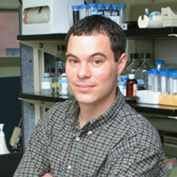Dr. Brian Strahl, Assistant Professor of Biochemistry & Biophysics will attend a White House ceremony in honor of his selection for the Presidential Early Career Award for Scientists and Engineers.

In February 1996, President Bill Clinton commissioned the National Science and Technology Council to create an award program that would “honor and support the extraordinary achievements of young professionals at the outset of their independent research careers in the fields of science and technology.”
The Presidential Awards are intended to recognize and nurture some of the nation’s finest scientists and engineers who, while early in their research careers, show exceptional potential for leadership.In addition to helping support the continued development of the awardees, the awards are designed to foster innovative and far-reaching developments in science and technology, increase awareness of careers in science and engineering, recognize the scientific missions of participating agencies, enhance connections between fundamental research and national goals, and highlight the importance of science and technology for the nation’s future.
Strahl’s research interests are chromatin biochemistry and gene regulation. Chromatin, a complex of nucleic acids and proteins, binds DNA into higher-order structures, ultimately forming a chromosome.
The National Science Foundation and the National Institutes of Health are among 11 federal agencies participating in the awards.Strahl’s award is associated with a five-year NIH research grant. In June, Strahl was one of 15 scientists chosen as 2004 Pew Biomedical Scholars by the Pew Charitable Trusts and the University of California at San Francisco. This scholarship program offers each scientist a $240,000 award to help support his or her research during a four-year period.
Past NIH Presidential Award recipients from UNC are Dr. Regina M. Carelli, associate professor in the College of Arts and Sciences’ department of psychology (2001); and Dr. Roland Tisch, associate professor in the School of Medicine’s department of microbiology and immunology (1997). Dr. Scot T. Martin, who was assistant professor of aquatic and atmospheric chemistry in the School of Public Health’s department of environmental sciences and engineering from 1997 to 2000, received the award in 1999. (He now is a faculty member at Harvard University).
